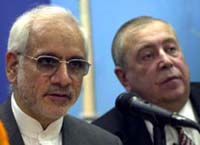Iran accepts Russia's offer
Russia and Iran have agreed in principle on a joint venture to enrich uranium. The news comes after the head of Rosatom spent three days in Iran. Moscow’s offer of a joint uranium venture remains the only realistic way that Iran can avoid international sanctions.

Talks between Moscow and Tehran have been going on since November 2005 and time is now running out for Iran. The International Atomic Energy Agency (IAEA) is due to meet in a week’s time in Vienna, where a decision will be taken over whether or not to pass on a dossier on Iran to the UN. The West has been monitoring Iran’s intention to create nuclear weapons and a discussion on this theme in the UN threatens to spark international sanctions to be taken against Iran.
Gholamreza Aghazadeh, Iran’s vice-president and one time head of the Iran’s nuclear agency, was optimistic when announcing the link up at a press conference, “We have agreed in principle to Russia’s offer; the details of the agreement are still to be ironed out.”
His Russian counterpart, Sergei Kirienko, was more affirmative in his statement. He said that there were “almost no logistical, technical or financial problems with the joint venture.” However, Kirienko confirmed that “the offer to create a joint venture is only one part of a complex way of preserving the peace.” Not only agreement to uranium enrichment in Russian territory is demanded of Iran , but also confirmation that they will stop work on uranium enrichment (in Iran).” They prefer not to speak about this in Tehran.
Alexei Sazonov, deputy director of the Russian Foreign Ministry department of information and the press remarked in an interview with Vremya Novosti that “the idea of the joint venture was made by the Iranians and in principle it leads to a conclusion.” Iranians would lose their reputation as serious politicians if they were to agree to everything straightaway. Aghazadeh said that “they had decided to continue talks in Moscow in the near future.”
The White House has decided that it is premature to talk about the agreement forged by Alexei Kirienko. Yesterday National Security Advisor Steven Hadly announced that “in any agreement the devil may hide in the details and so we must wait and see what happens.”
The Russian Minster for Foreign Affairs Sergei Lavrov, speaking before Aghazadeh’s announcement, promised that contact with Tehran would “continue until the IAEA meets in Vienna on 6 March.” In spite of the agreement, it is essential for the continuation of talks that the Iranians are completely honest. Konstantin Kosachev, Chairman of the International Affairs Committee, believes that Iran will finally declare its position as regards its nuclear dossier before the IAEA conference. Kosachev think that they have “made a step in the right direction, but not a decisive step.”
The delegation of Russian diplomats headed by Vice-President of the State Duma Yuri Volkovy sent to Tehran yesterday will carry on the progress already made. The press secretary of the delegation Vasily Kononenko told Vremya Novostei that they would “have two days of working, in the oil, transport and energy ministries and they would hold talks in parliament including with the speaker Haddad Adel, one of the leading figures in modern Iran.”
Vasily Kononenko told Vremya Novostei that the head of the delegation and his parliamentary colleagues said that “friends meet in the kitchen, not when things are good, but when they are bad.” The delegation will have to give the Iranians some answers before they make a guarantee to work on the joint venture in the long term. Yuri Volkov said that “The Iranians ask what will happen if in the future Russia decides that it no longer wants to work on the manufacture of atomic energy.”
Vremya Novostei
Translated by Michael Simpson
Subscribe to Pravda.Ru Telegram channel, Facebook, RSS!





